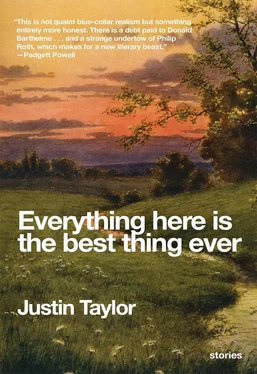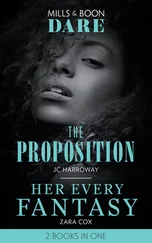It was a cruel comment, I knew even as I said it, but it did what I needed it to do — truncated the discussion so I could play this game, which has muted colors and I can mute the music, thus exercising forms, degrees, of control. I lose at the game when I get caught up staring into the background — that radiating black that can be generated only by a back-lit screen. Or when it gets just too fast. When I lose the game the screen fills with candy-colored snow.
Jennie said that between the two of us I have more experience with religion, even if what I know is basically about something else. At least, she said, it’s something . And when I still wouldn’t take the soft-sided white book from her trembling hands she called me a whole string of bad names and curled up on the floor with it, beside the couch. She cried into the ball she’d made of herself and once I tried to stroke her hair but she wouldn’t be touched so I just sat down close to her and fired up the game. Eventually she fell asleep and her breathing is the only sound in this room, along with the tiny sexual slaps of my thumbs on the plastic buttons.
Snow again. I lose. This game is designed to end, not to be beaten; I doubt they even programmed a graphic for the YOU WIN screen. Once you hit level eighteen the pieces are falling almost quicker than hand-eye coordination can trace, and it can go faster and faster. It outlasts you.
I play again and at level eighteen reach a sort of ecstasy of self-and-game where we are as close to becoming one being as we ever will and this lasts some amount of time and then ends. Snow again. I enter my initials on the high-score screen, ranked number one. The list erases every time you shut the Nintendo off.
Outside the window there is a fiery brightness that fills the world, a limitless wave, jellying up the street towards us.
When people think about the Apocalypse they imagine knowing what it is that will bring them down. Ask the shades of Hiroshima about that one. The assumption of knowledge is one part of the fantasy of mastery, by which I mean the hope against all damned hope of survival. I never thought about what time of year the End might come, but looking back, I guess I always figured it would be in the crush of summer. And I was right.
I watch Jennie, whom sleep has loosened from her furious ball. She is stretched out across the floor, and how beautiful she is. I wish the world wouldn’t end before we could make up and die holding each other.
I glance out the window at the bright wall. It seems closer, but slower. I notice the watch on my wrist and the clock on the TV have both gone to 88:88. I wonder what that means, if it tips the scales in my mind concerning who/Who is responsible. When it occurs to me that Jennie will most likely die in her sleep I almost wake her but then I don’t. I am calmed by watching her steady breathing and there isn’t time to reconcile anyway, what with the way she gets when she’s sulking. I’m going to let her sleep through it, through whatever exactly is out the front window, reclaiming the driveway, the sidewalk not dissolved but disappeared. For all its luminosity, the wall is not painful to look upon — it is oddly soothing. It leaves no trace or shadow of what is behind or within. It is perfectly opaque. I see it the same way that Jennie sees the Scriptures, and also like Jennie, I get madder and sadder and madder again, but I won’t look away.
We made it to New York.
That’s how we put it when we talk about it with each other, even though it means something different to each of us, and even though we’re both pretty used to it by now. I came straight from school, worked some crap jobs, then landed a decent one. It’s at a hedge fund and I hate it, at least theoretically. In practice I find the more time I spend doing it the less I feel one way or the other. It’s just what I’m doing, what I do. I work with nice enough people. They started me out as an assistant but I’m already almost a junior manager. Who knows where I might wind up if I stick around?
Leah stayed on in our college town, waitressing and getting fired from waitressing. When she got tired of that she moved home for a while, then traveled. Europe of course, and the Far East. Now she’s studying sculpture. She talks about getting “my MFA,” as if dropping by the school to pick up something she left there, maybe a coat.
We never dated, of course, but what we had — there’s no exact name for it — was well understood and envied within our circle. I mean the other guys sometimes would ask me what it was like to go to bed with her. She was the recently turned lesbian they all wanted to be the one to turn back. And how smug was I? How quick — but also truly pleased — to explain that I was the exception that proved her rule. Ah, college.
I suppose we are still enviable, since what we have is the same as it ever was, though probably most of the people I know now wouldn’t envy us.
Leah is in a new version of our old world, but I don’t worry too much about losing her. We have the fullness of our history to draw on. We see each other as often as our schedules allow.
I’m supposed to be going with her to an opening tonight, and I’ve been looking forward to it, but I get held up at the office and have to send an apologetic text message canceling on cocktails but promising to meet her at the gallery.
Because of this, Leah greets me curtly and then rejoins the little semicircle she was in when I tapped her shoulder. A group of people all about our age are standing around a rotund, gray-haired man who I believe has an essay in the current New Yorker, which I subscribe to, though if he is who I think he is then I fell asleep while reading his article. To show her that I am other than a perfect philistine, I spend several minutes studying what is clearly the star piece in the show. It has this monumental physical presence and a sort of explosive personality, like Rauschenberg covering Nevelson, or vice versa. See? I say to the Leah in my head. I know a thing or two about this stuff . The Leah in my head is very impressed.
I glance across the room. She’s still doing her thing over there. I go for the refreshments: a long metal table with jugs of wine and lightly sweating pyramids of cubed cheese. I am pouring myself a burgundy when an older man holds out his clear plastic cup.
“Fill me up?” He smiles suggestively, but with more than a touch of self-awareness, maybe even self-parody. I laugh and accidentally shake the jug a little as I pour, spilling a few drops onto the man’s hand, but thankfully I don’t stain his cuff. “Oh,” the man says. “Now you’ll have to lick it off.”
Am I going to laugh at this? He’s laughing.
Okay I’m laughing.
We laugh.
Richard has a full head of salt-and-pepper hair, and is thickset in a way that suggests how he’ll go to seed, but also that he hasn’t yet. He prides himself on the fact that he can be scandalous, “but hardly after two cups of bottom-shelf merlot,” he says, and I remind him it’s burgundy we’re drinking and Richard laughs in a way that is almost shrieking.
After a quick turn up and down the gallery, chatting, we come back to the table for refills. The burgundy is gone. Now we really are drinking merlot.
Leah comes up to us, rosy, buzzed, ready for my attention. Richard drifts off. Leah wants to point out Alison, the conceptual portraitist she’s been seeing but is currently on the outs with. I can’t remember what happened this time. There’s always some particular incident — the ostensible reason — but at bottom the fact seems to be that there is a natural ebb and flow in the women’s ability to tolerate each other. But there is real love there, Leah is certain.
Читать дальше












